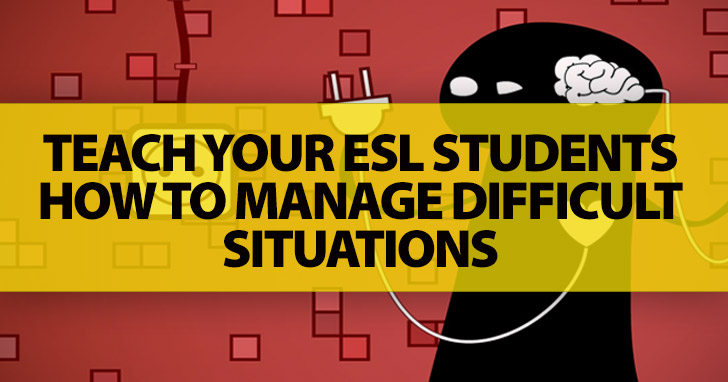Who hasn't been in a tough spot at one time or another?
I know I have. Sadly getting into a mess is rather easy, but getting out of one, not so much. Now let's consider our ESL students. Many of them will need to travel abroad, and whether it is for pleasure, business or study, being able to interact with others is a requirement. Even if they don't travel, they might also have to interact with foreign visitors and, because of that, they have to be ready to face all kinds of situations. Don't let them go through these situations helpless. Prepare them by talking about these possibilities and practice with them. In difficult circumstances, they first need to understand what went wrong and then find a way to make it better. Let's take a look at the following scenarios and what you can teach your students.
Keep in mind they can use these expressions themselves or understand them if they are used by others.

Provide Learners with an Effective Way out of a Tough Situation
-
1
Awkward or Inappropriate Conversation Topics
There are topics that can be awkward or even inappropriate. There are things that should not be discussed at certain times or around certain people. Some topics could offend others and cause problems. The best solution to this is to avoid or change the subject when it comes up. Take a look:
- I'm uncomfortable talking about this.
- Could we talk about something else?
- This is making me uncomfortable, could we change the subject?
- I don't think this is the time to discuss this.
-
2
When Someone Was Offended
Sometime we laugh at the wrong time or use the wrong words. In any case, offending someone without intention to do so is very common. So what do we do about it? These phrases can help:
- I think I may have offended you. I didn't mean to do it.
- I'm sorry I didn't mean to offend you.
- That isn't what I meant to express, and I believe I may have hurt your feelings. What I wanted to say was....
- There seems to be a misunderstanding what I meant was ….
-
3
When a Mistake Has Been Made
We all make mistakes and as the saying goes, “to err is human; to forgive, divine”. So why not give someone the opportunity to be divine. Teach your student to apologize for mistakes they have made. Look at the following:
- I'm terribly sorry about any inconvenience I may have caused.
- Please accept my apologies.
- I'm very sorry about that.
-
4
When It Isn't a Good Time to Discuss Something
Sometimes the problem is just poor timing. Saying the wrong thing at the wrong time can happen to anyone. In this case what your students need to learn is that the best way to handle this is by cutting the conversation short.
- Let's talk later.
- Let's continue this conversation tomorrow.
- Look at the time! I have got to run. Let's talk later.
- Why don't we discuss this tomorrow at lunch?
-
5
Disagreeing
People don't always see eye to eye. We often disagree with each other and that's fine. Your students should see that expressing a different opinion is perfectly fine as long as they do this with respect.
- I'm sorry I simply don't agree with you on that.
- I understand but I disagree
- I have some reservations about that.
-
6
Asking Someone Not to Do Something
There are times we need to tell people what we want them to do and also what we don't want them to do. Asking people to do things seem easier than asking them not to do things. Again, it is all a matter of showing respect and consideration.
- Would you mind not discussing that at the meeting?
- Could you please avoid mentioning that problem?
-
7
Avoiding Commitment
Some people ask for too many favors. For many it is awkward to say no to favors, but it shouldn't be. There are times we can take on new commitments and times we can't.
- You'd better ask someone else to do that. I'm not sure I'll be able to.
- I really can't make any promises. I have so much on my hands already.
- I don't think I can handle that right now. Why don't you ask someone else?
Don't let uncomfortable situations paralyze your students.
With a bit a of practice, they will get the hang of it.
P.S. If you enjoyed this article, please help spread it by clicking one of those sharing buttons below. And if you are interested in more, you should follow our Facebook page where we share more about creative, non-boring ways to teach English.







